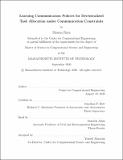Learning communication policies for decentralized task allocation under communication constraints
Author(s)
Raja, Sharan.
Download1227031992-MIT.pdf (5.090Mb)
Other Contributors
Massachusetts Institute of Technology. Center for Computational Science and Engineering.
Advisor
Jonathan P. How.
Terms of use
Metadata
Show full item recordAbstract
Multi-UAS teams often operate in ad-hoc communication networks where blind application of consensus algorithms perform poorly because of message intensive nature of such algorithms. Important messages can get lost due to interference or collisions with other messages, and the broadcasting of less important messages can limit the effective bandwidth available for the team. This thesis presents a novel algorithm - Communication-aware CBBA (CA-CBBA) that learns a cooperative communication policy for agents performing decentralized task allocation using consensus based bundle algorithm (CBBA) by accounting for these communication issues. In our approach, agents learn to use features, such as local communication graph density and value of their own messages, to both censor and schedule themselves amongst the other agents competing for shared communication medium. Experiments show that the learned communication policy enables more efficient utilization of the shared medium by prioritizing agents with important messages and more frequently censoring agents in denser parts of the network to alleviate the "hidden node problem." The approach is shown to lead to better task allocation outcomes with faster convergence time and conflict resolution rates compared to CBBA in communication-constrained environments. Policy learnt by agents trained on a specific team size and task number is shown to generalize to larger team sizes in task allocation problems with varying task numbers. To our knowledge, this is the first task allocation algorithm to co-design planning algorithm and communication protocol by incorporating communication constraints into the design process; resulting in better task allocation outcomes in communication-constrained environments.
Description
Thesis: S.M., Massachusetts Institute of Technology, Center for Computational Science and Engineering, 2020 Cataloged from student-submitted PDF version of thesis. Includes bibliographical references (pages 57-60).
Date issued
2020Department
Massachusetts Institute of Technology. Center for Computational Science and EngineeringPublisher
Massachusetts Institute of Technology
Keywords
Center for Computational Science and Engineering.